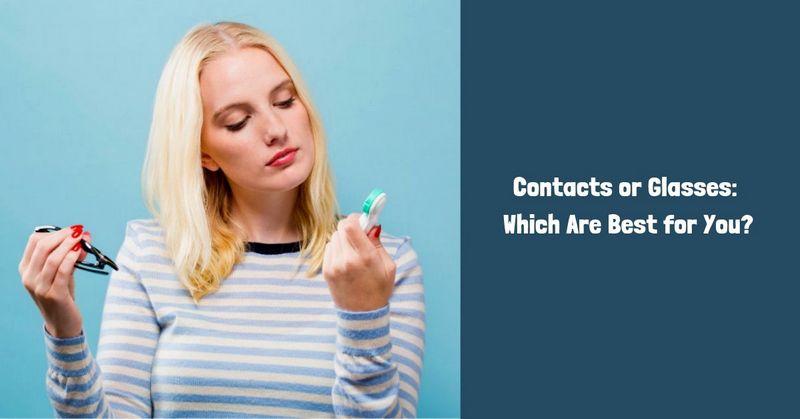What Are the Pros and Cons of Contacts and Glasses?

According to statistics, about half of the world’s population have certain vision problems. Previously, they were corrected only with the help of glasses. But for several decades now, people increasingly prefer contact lenses. The entered into mass consumption and saved many men and women from the constraints, inconveniences and complexes they had from childhood.
It is impossible to state that the contact correction has supplanted the eyeglasses, or that the contacts are better than the glasses. After all, today each of these products is in demand. Let’s see the advantages of these two types of vision correction.
Glasses: Pros and Cons
Glasses are the easiest and most affordable means to correct poor vision. The first mentions of this invention date back to the XIII century when glasses were used for the first time in Italy in order to better see the blurry picture.
Much time has passed since then, production technologies have been improved, and today the thinnest lenses can correct even the worst eyesight. It is possible to choose a stylish frame and make corrective glasses a fashionable accessory.
Advantages of glasses
- Long service life;
- Low cost compared to contacts (of course, if you don’t buy expensive frames);
- Easy to use (it takes a few seconds to put them on);
- Easy to care (it is enough to wipe then and put in the case);
- Ability to do any makeup, as well as hide the flaws of the face and give more charm to the appearance.
Along with a large number of advantages, eyeglasses have several disadvantages that often interfere with the process of wearing.
Disadvantages of glasses
- Wearing them for a long time can adversely affect the condition of the eyes: lead to a decrease in the tone of the eye muscles and the progression of myopia;
- Wearing glasses is very problematic in sports, dancing, swimming, mountaineering, boxing and other activities;
- With a sharp change in temperature, the eyeglass lenses mist over, causing visibility to deteriorate;
- Glasses can develop complexes, especially in childhood;
- When summer comes, it becomes difficult to combine wearing sunglasses and corrective glasses.
Contacts: Pros and Cons
The first contact lenses were rough. But in 1960 there was a breakthrough in ophthalmology – the world learned about the first soft contact lenses. Over time, they improved technology, materials, created new types of contacts. And today we can choose suitable lenses from a wide range from leading manufacturers
Advantages of contact lenses
- Contact lenses do not limit the field of view, so you will always see clearly in them;
- They are invisible and do not change your appearance;
- They can not be broken, which means you do not risk damaging the eyes with splinters;
- It is convenient to play sports, dance, lead an active lifestyle. Contacts take up little space in the baggage, so they can easily be taken on trips;
- Contact lenses are colored, which means they can change or enhance the color of your eyes;
- Depending on the mode of wearing, contacts can be worn for up to 1 month without removing it from the eyes.
These positive aspects make the lenses very popular among people with poor eyesight. They simplify and improve the lives of many men and women around the world.
Disadvantages of contact lenses
- Unlike glasses, which are bought for several years, lenses require regular cash investments;
- You cannot wear them in “cold” and allergic diseases;
- If handled carelessly, the lens may break, and you will have to buy new contacts ahead of time;
- Improper care and violation of the mode of wearing/replacing can lead to very difficult and unpleasant consequences – allergic reactions, infections, corneal ulcers, etc.;
- It can be difficult for beginners to put on and take off lenses. It takes more time than glasses.
What to choose?
In each case, the choice is made individually. And no one can categorically advocate “for” or “against” one of these types of vision correction because both of them are good and both have their drawbacks.
Why make a choice in favor of glasses or lenses if you can alternate them? Choose the main means of correction, give preference to the one that is more convenient for you. And the second one can be used as a fallback.
Safety RX recommends listening to your needs and consulting an ophthalmologist in order to determine the best option for you!
Category: Eye Health